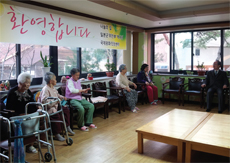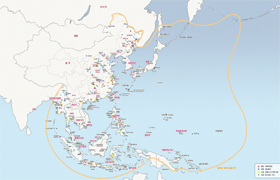NORTHEAST ASIAN HISTORY FOUNDATION 07/2013
-
Written by Seo Hyun-joo, Research Fellow at NAHF Research Department

Osaka mayor Toru Hashimoto said in the May 13 press conference: "If you think about those Japanese soldiers risking their lives in a rain of bullets in the battlefield, and if you want them to get some rest, you can see that a 'comfort women' system was necessary. A 'comfort women' system was common in countries around the world at that time, including during the Korean War and the Vietnam War. It is therefore unfair that only Japan's case has been singled out for the practice. Even though Japan is receiving harsh criticism for using the military to commit rape at national levels, it should be clarified that there is no evidence to prove that the Japanese government used violence and threat to kidnap those women.
Hashimoto's remarks, appearing on The Asashi Shimbun the same day, provoked outrage worldwide. In a statement released the next day by the spokesperson for the South Korean foreign ministry, his remarks were denounced as "insult to women's dignity and a less-than-shameless attempt to distort history." The spokesperson for the Chinese foreign ministry also said that "we deeply resent such provocation against human conscience and the justice of history."
 House of Sharing
House of Sharing
Hashimoto's "Comfort Women" Remarks Under International Criticism
Criticism also came from across the Pacific. On May 16 (local time), the spokesperson for the U.S. Department of State stated that "what happened in that era to these women who were trafficked for sexual purposes is deplorable and clearly a grave human rights violation of enormous proportions." House of Foreign Affairs Committee Chairman Ed Royce also rose on the House floor to condemn the use of "comfort women," saying that it was a state-sponsored program of sexual brutality and runs counter to every recognized international norm against human dignity. The New York Times and other major U.S. newspapers also criticized Japan that "while Germany established its place in Europe decades ago by honestly accepting history, why does Japan still continue to distort historical facts?"
In an international conference held on May 27 where he said he would clarify the meaning of his previous remarks, Hashimoto maintained that "a 'comfort women' system was necessary" and that "there is no evidence to prove that the Japanese government or military systematically kidnapped or trafficked women." Hashimoto's such claims are nothing new. They are almost identical to 'The Facts,' the advertisement that Japanese lawmakers, intellectuals and journalists jointly took out on The Washington Post (June 14 2007) in order to stop the adoption of the 'comfort women' resolution submitted to the U.S. House of Representatives. A similar advertisement appeared again five years later, on November 4, 2013, on Star Ledger, a local newspaper of New Jersey where a monument in memory of "comfort women" was erected. In this advertisement Shinzo Abe was among the people who denied that the Japanese military had forced women into sexual slavery. They tend to judge the responsibility of the Japanese military and government for the "comfort women" issue only on the basis of whether the military sexual slavery was "forced" or not. In their narrow mind, it is implied that the involvement of the military and the government doesn't matter and shouldn't be a problem as long as the woman were not taken by force. This may have something to do with the following facts, a reality that they might want to deny: That the Japanese military created, maintained, and expanded the "comfort station" system was sufficiently proved by the official documents of the Japanese military, even if the operation was conducted by a contractor, and the contractor was dictated by the military, and that the fact that "comfort women" were forced into sexual slavery is supported by documentary evidence, including the Far East International Military Trial materials and the Dutch government's investigation report, and testimony by the victims and soldiers.
The Case for "No Evidence of Forced Sexual Slavery" Is Very Weakly Grounded
 Map of 'Comfort Stations' across East Asia
Map of 'Comfort Stations' across East Asia
As a specific example, on June 27, 1938, Northern China Area Army Chief of Staff Okebe Naosaburo (岡部直三郞) ordered in the Cautionary Notice on the Military's Treatment of Civilians that "… rape frequently taking place in various places ( . . . ) is serious treason because it hinders the military's overall operations by disturbing security ( . . . ) it is essential that facilities for sexual comfort should be set up as soon as possible to prevent soldiers from committing crime that could be avoided if such facilities were available." The relationship between the contractor and the military is well indicated in the notice (Army Memorandum No. 745) sent to the Chiefs of Staff of the Northern and Central Expeditionary Armies by the Aide-de-Camp of the Army upon approval of the Vice-Minister of the Army on March 4, 1938. In the memorandum, the army instructed that since recruiting workers from within Japan to work on setting up comfort stations in China under the name of the military involves the risk of damaging the military's reputation and giving ordinary citizens wrong ideas, the recruiting should be controlled by the expeditionary armies, the contractor should be selected with utmost care, and work closely with the local police and MP in recruiting to ensure that there is no mistake in maintaining the military's reputation and preventing any trouble that might cause public concern.
It is because of this immutable evidence that Hashimoto, at the foreign press conference on the 27th, admitted to the Japanese military's involvement, saying that "it is true that vessels (battleships) were used to transport 'comfort women' and the Japanese military was involved in the operation and management of comfort stations." Under the circumstances, the logic he could use in order to deny the responsibilities of the Japanese government and military was this; Japan alone should not be blamed for "comfort women" and state-regulated prostitution purported to be the basis of "comfort women" because they were also present in other countries and their militaries, and the government and military may be held responsible only if they were involved in systematic kidnapping or human trafficking, but there is no evidence found so far to support that this is the case.
First of all, the notion that state-regulated prostitution was common worldwide at that time is not consistent with the historical facts. In the early 20th century, countries across Europe saw that state-regulated prostitution encouraged the trafficking of women, and, by the 1920s, started abolishing state-regulated prostitution in their colonies in Asia as well as their own land. In Singapore, the Philippines, and Indonesia, colonized by the U.K., the U.S., and the Netherlands, respectively, the shutting down of brothels and the sending back prostitutes to their own countries were in progress. Also in Japan, campaigns waged to abolish state-regulated prostitution during the 1920s to 1930s resulted in the resolution to abolish state-regulated prostitution in about ten prefectures.
The Case for "The Government or Military Not Responsible Unless Involved in Systematic Kidnapping" Also Runs Counter to Japan's Domestic Law
The claim that the government or military is not responsible unless involved in systematic kidnapping or human trafficking also runs counter to Japan's domestic law as well as the international rules of the time. In 1921, the League of Nations drafted an international treaty banning the human trafficking of women. Under this treaty, soliciting women under 21 for prostitution and soliciting women below 21 for prostitution by using fraud, violence, threat or any other compulsory means were banned. (Japan signed this treaty in 1925). And Article 226 of the Criminal Code of Japan defines not only pillage (keeping people virtually under one's control by violence or threat) for the purpose of transfer outside the country but also kidnapping (keeping people under one's control by means of deception or seduction) and human trafficking (selling and buying people for payment) as a crime. And there are people actually punished under this clause.
And the claim that no evidence has been found is very flimsy and weakly grounded, as Hashimoto himself admitted that he may not be sure because the Cabinet decided on May 7 that there was a possibility that new evidence might turn up. The records of the Far East International Military Trial and the Dutch government's investigation report, and testimony of the victims of sexual slavery and the soldiers all support the forced nature of sexual slavery.
As we have seen so far, Hashimoto's claim is full of ignorance and far-fetched interpretation of historical facts, and far off from the notion widely accepted in the international community that "comfort women" were sexual slaves forced to serve Japanese soldiers against their will. The problem is that his claim is quite widely accepted within Japan. As an example, the June 11 poll by The Asahi Shimbun shows that when asked whether the historical perception of Abe, who, like Hashimoto, denies the evidence of the coercion of comfort women, has a positive or negative influence on Japan's foreign affairs, much more respondents answered "positive" (44%) than "negative" (26%). It is urgent to let them know the historical facts and truths about 'comfort women' properly.


